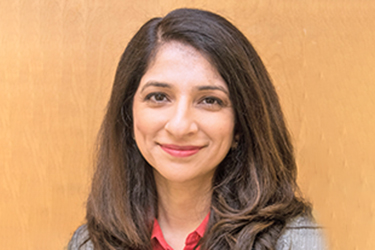
For Muslims worldwide, Ramadan is an annual religious observance that involves prayer, fasting and celebration of community. As a Muslim, Aadia Rana, MD, Associate Professor in the Division of Infectious Diseases, observes Ramadan every year. She offers this insight into how Ramadan is celebrated and its importance to her personally and professionally.
What are the basics of Ramadan that people of other faith backgrounds may not know?
Ramadan lasts for an entire month. It is the ninth month on our lunar calendar, so it shifts 10 days earlier from year to year. This year, Ramadan is observed from sunset on April 12 to sunset on May 12.
During this time, Muslims abstain from food and drink during the daylight hours, beginning an hour before sunrise and lasting until sunset. The daily fast is broken with an evening meal. This “iftar” is often a joyful gathering with family and friends, followed by congregational prayers that last late into the night.
During Ramadan, Muslims also focus on almsgiving. One of the central tenets of the faith is to care for the poor, so we often choose this month to make charitable gifts to those in need.
How does observing Ramadan specifically impact people who work in a healthcare environment?
It is estimated that nearly ten percent of all healthcare workers in the US are Muslims of varying practice. While those who strictly observe Ramadan’s prescribed fast from food and drink may face hunger or thirst during the day, it is even more likely that they will be experience fatigue from late hours of prayer, which often last until after midnight.
For this reason, friends and colleagues may not join in events during the holy month, especially if the planned activity specifically involves food. For our students, residents, and fellows, it may be helpful to consider alternate schedules, such as night shifts, where possible.
What are some of the ways Ramadan might impact our patients and their health?
Communication is indispensable in understanding our patients’ preferences and practices. There are certain exemptions from fasting, including illness and pregnancy. However, many devout Muslims may wish to fast even during these times. Adjusting medications for conditions like diabetes and offering sound medical guidance about the safety of fasting is an important consideration for all health care practitioners. Another patient concern during Ramadan may be routine bloodwork. Patients may prefer to delay medical visits until the time of fasting ends.
This year, the National Muslim Task Force on COVID-19 (NMTF) and the National Black Muslim
COVID Coalition (NBMCC) on Ramadan 2021 and COVID-19 Vaccines released a joint statement to encourage those observing Ramadan to go ahead and schedule their COVID-19 vaccine appointment. They note that none of the components of the vaccine contain material that would violate the fast, and remind us of the importance of promoting the health of society.
How can a person express good wishes to someone observing Ramadan?
UAB is a wonderfully diverse place. We are fortunate to be able to learn and grow from each other. Sharing good wishes is as simple as any other holiday greeting. Telling someone Ramadan Mubarak, wishes them a “blessed Ramadan.” Demonstrating one’s awareness of this important holiday is generally considered an immeasurable kindness.